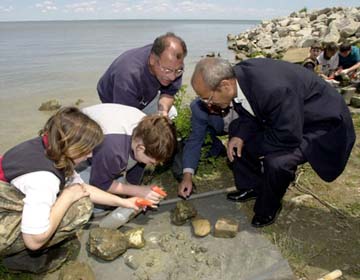June 5, 2001 - The Detroit News: Nepalese learn water-testing skill in Macomb
Peace Corps Online:
Peace Corps News:
Peace Corps Library:
Reference:
Service:
June 5, 2001 - The Detroit News: Nepalese learn water-testing skill in Macomb
Nepalese learn water-testing skill in Macomb

Read and Coment on this story about a Nepal RPCV who has helped organize a local school near Detriot to help teach water testing in Nepal at:
Nepalese learn water-testing skill in Macomb*
* This link was active on the date it was posted. PCOL is not responsible for broken links which may have changed.
Nepalese learn water-testing skill in Macomb
ST. CLAIR SHORES -- The Seti River in Nepal is thousands of miles from Lake St. Clair, but the waterway near the Himalayan Mountains has a lot in common with this heart-shaped lake just north of Detroit.
Both waterways are not only home to the same type of aquatic insects, they also have similar pollution problems.
A team of Nepal educators journeyed to Macomb County to learn how to test the Seti for water quality and find out how insect life is faring in their mid-Asian homeland. They will take what they learned back to their country to implement similar environmental testing procedures for school children there.
At Memorial Park at Masonic and Jefferson, they watched a sixth-grader dredge a pile of muck from Lake St. Clair.
"Mayfly, crawfish, leech, snail, fishing spider ... we have these, too," said Uprenda Subedi, pointing to the chart the students used to identify the critters.
Subedi, an administrator with the Ministry of Education in Nepal, was amazed to see that many of the invertebrates found in the mud are also prevalent in the bottom of the Seti as it flows through his hometown of Pokhara in western Nepal.
Subedi, along with Parshu Ram, who trains teachers in the Pokhara district of Nepal, were in Macomb County last week.
Most Americans associate Nepal, a nation of than 24 million astride the Himalayan mountains north of India, as a country of crystal-clear alpine rivers and streams.
That may be true at the 10,000-foot level, but not down in the valleys where most of the people live, according to Murari Suvedi, a Nepalese native and now a Michigan State University professor who helped put the trip together.
"Everything drains into the rivers, including human waste and (agricultural) chemicals in the soil," Suvedi said.
"By the time the rivers flow down into India, they're in very bad shape. We're finding the same problems in our rivers that you have here."
Program travels to Nepal
Local environmentalists say there are various reasons for water contamination problems in Lake St. Clair, including human waste and agriculture pollutants.
Macomb County school children have done water quality testing along the Clinton River watershed for years. But the idea for transporting those programs to Nepalese schools started a couple of years ago with a group of Michigan State University undergraduate students who were studying in Nepal.
Suvedi teaches a semester-long course in Nepal each year for 30 MSU students.
"Our students discovered a problem with the water quality along the Seti," Suvedi said. "They opened my eyes. So I started looking around here for someone who could help put together a program in Nepal on water quality."
He found Patrick Livingston, an MSU Extension agent based in Mt. Clemens and a U.S. Peace Corps volunteer in the 1970s in Nepal. Livingston is also involved in training Macomb County schools and their teachers in water quality testing.
Livingston wrote a grant proposal to replicate the Michigan school experience in schools in the Kaski District of Nepal.
"We had the program here, so I tinkered with it and took it to Nepal a year ago," Livingston said. "We had seven schools involved in testing the Seti River."
Environment worsens
The environmental issues have worsened since he was a Peace Corps volunteer there 25 years ago, Livingston said.
"In the 1970s, there was basically no solid waste," he said. "People there found a use for everything, even if was just a plastic bag. Now, they've got a landfill problem and a growth problem."
Those are also problems found in Macomb County.
The Seti runs through a 700-foot-deep gorge, which creates spectacular scenery and a resulting tourist industry. Hotels have been built in recent years along the rim of the gorge.
Although the local people use the river's waters for everything from clothes washing to ritual ablutions, the city of Pokhara still has no municipal sewage treatment plant, Livingston said.
A water-quality testing program for school children is the first step toward raising environmental consciousness in the general population, Suvedi said.
"Twenty years from now, these kids will be the best environmental advocates," he said.
You can reach Mike Wowk at (810) 468-0343 or mwowk@detnews.com.

Some postings on Peace Corps Online are provided to the individual members of this group without permission of the copyright owner for the non-profit purposes of criticism, comment, education, scholarship, and research under the "Fair Use" provisions of U.S. Government copyright laws and they may not be distributed further without permission of the copyright owner. Peace Corps Online does not vouch for the accuracy of the content of the postings, which is the sole responsibility of the copyright holder.
.
hello
I am very thankful to the site which provided me the opportunity to know few steps that were taken in way of aquatic environment of Nepal and also there was a collaboration and cooperation established between the two different distinguished countries. Being a student of Masters in Science and worked in the same Aquatic insects of Bagmati River in Shivapuri area of Nepal, I felt the educational cooperation is quite helpful to build capacity in least developed countries like nepal. These type of program should continue in other parts of Nepal.


